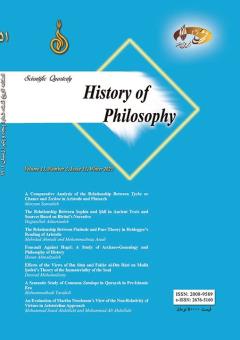-
-
List of Articles
-
Open Access Article
1 - يادداشت سردبير
Hossein Kalbasi Ashtari -
Open Access Article
2 - A Comparative Analysis of the Relationship between Tyche or Chance and Techne in Aristotle and Plutarch
Maryam Samadieh -
Open Access Article
3 - The Relationship Between Sophia and Ṣūfī in Ancient Texts and Sources Based on Bīrūnī’s Narrative
Hojjatullah Askarizadeh -
Open Access Article
4 - The Relationship Between Finitude and Pure Theory in Heidegger’s Reading of Aristotle
Mehrdad Ahmadi Mohamadreza Asadi -
Open Access Article
5 - Foucault Against Hegel: A Study of Archaeo-Genealogy and Philosophy of History
Hasan Ahmadizade -
Open Access Article
6 - Effects of the Views of Ibn Sīnā and Fakhr al-Dīn Rāzī on Mullā Ṣadrā’s Theory of the Immateriality of the Soul
Davood Mohamadiany -
Open Access Article
7 - A Semantic Study of Common Zandaqa in Quraysh in Pre-Islamic Era
mihammadhadi tavakoli -
Open Access Article
8 - An Evaluation of Martha Nussbaum’s View of the Non-Relativity of Virtues in Aristotelian Approach
Mohammad Saeid Abdollahi Mohamad Ali Abdollahi
-
The rights to this website are owned by the Raimag Press Management System.
Copyright © 2017-2026







